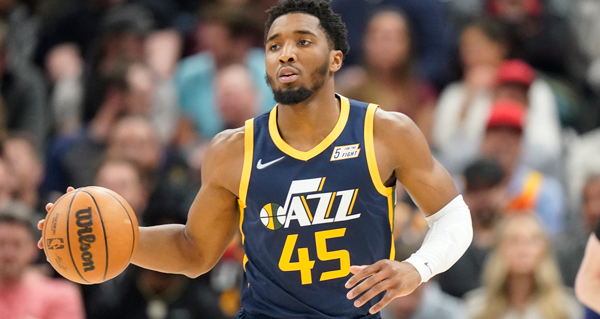Most reports include the fact that Donovan Mitchell grew up in the tri-state area or, more parochially, that he was born in Westchester and attended Greenwich Country Day. Woj, his mind tapioca'd by push notifications, calls Mitchell a "greater New York native." The implication is that he belongs in New York, or that his heart lies there, that he would have a keener appreciation for the Knicks' history and his place within it than an NBA star who grew up in Los Angeles, or Omaha. As ever, with guys who were raised in and around New York, his preference seems to be the Knicks or a really good team. If we're to believe the rumors, he would be happy to play in MSG, Brooklyn, or Miami. This is, of course, little more than Mitchell's camp making a sound. The Jazz are now run by Danny Ainge, who would ship his best player to CSKA Moscow, if he thought it netted him the most assets.
To me, Mitchell has always seemed more of a small market player. It's the Definition of Rookie hoodie, the Zendaya tweets, the discord with Rudy Gobert that made both of them look like nattering incompetents. The sense that he has rabbit ears about criticism, the unsubtle methods through which he crafts his public image. Our perceptions of professional athletes are always unfair, blithely formed from media detritus and a handful of moments that for some reason live in our minds more enduringly than a hundred others. They're figures, not friends or colleagues. We formulate theories about them as if they were fictional, and meanwhile, they plot the arc of their very real lives. What appears like Donovan Mitchell playing at superstardom or homecoming hero is also serious business. We all want to be more than we are, and that can make us look faintly ridiculous.
It would be inarguably Knicksian to build the next few years of their future around a starting backcourt of two six-foot-one scoring guards, recreating a model that produced lots of winning, watchable basketball in Portland but never mounted a convincing championship run and was ultimately dissolved. Insert whatever corrections you want about R.J. Barrett's development or Julius Randle reassuming his 2020-21 form, Mitchell is not a transformative player. It's unclear what he is, truly, which is odd to say about someone who has posted roughly the same stats over the past four seasons. He's about 25 and 5, with pretty good efficiency. But what else?
Basketball's a team game, but a few players transcend. There's a group of them, 15 or 20 or so, who will excel more or less independently of what kind of squad they're on. Some of that is the undeniability of their talent and some of it that no coach in his right mind, if he were gifted Luka Doncic, wouldn't roll the ball out and tell him to do his thing. Every other player in the league—the non-elite—tends to look quite a bit better or worse depending on what kinds of opportunities they're getting, who they share the floor with, where they fit in the team's offensive and defensive schemes. Certain skills—shooting, rim protection—are more broadly applicable than others, but there are more granular things that you might not even call skills—the ability to make a particular kind of pass, the tempo at which a player moves through his cuts—that are intensely context-dependent. We know you're good off the ball, but in this set, we really just need you to stand in the corner. Our estimations of these guys tend to fluctuate wildly. They are something like the 40th- or 122nd-best player in the league. We're pleased with all the gaps that Robert Covington can capably fill, or we're dismayed that he's not Paul George.
If Donovan Mitchell were to be traded to New York, we would expect him to be approximately what we've seen in Utah. He's definitely too good to outright fail, and perhaps too fully formed to ascend to another level. What he's seeking, beyond the experience of living and working in a massive media capital, is not personal growth so much as to be glimpsed from a fresh angle. Not a different kind of basketball, but a different gloss on his performances. Getting in shape versus buying more flattering clothes. This was a reasonable thing to want as Utah began to reveal that their regular season excellence would dependably curdle into meek postseason exits, and now, with Gobert gone and Ainge looking to strip the roster for parts, Mitchell is well within his rights to ask out, with a polite if unlikely to be all that heeded request that he be sent to a curated selection of franchises.
Mitchell's 25, which is a fine time to start figuring out what you want for yourself, the shape you would like your career to take, even if you have little grasp of the fine mechanics that will determine its shape. If he does see himself as an A-lister, a franchise player on a title contender, there's no reason not to chase that dream now. Failure is assured in Utah, but less certain everywhere else. Maybe we'll think differently of him two or three years down the line. His insistence on what he is and what he can be is, at least, the first step toward making that happen.



